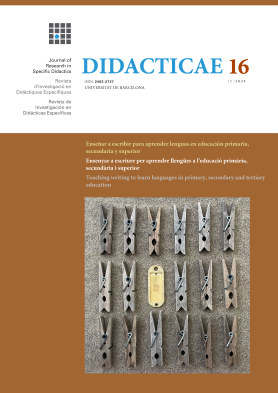La retroalimentación a través de cápsulas audiovisuales: Una propuesta pedagógica para intervenciones en alfabetización académica
Feedback through audiovisual capsules: A pedagogical proposal for interventions in academic literacy courses
DOI:
https://doi.org/10.1344/did.45867Keywords:
feedback, writing, higher education, education technology, audiovisual capsulesAbstract
The present qualitative research study aimed to describe and evaluate a practice of digital feedback with personalized audiovisual capsules. Thus, based on an intervention in academic writing in a disciplinary Engineering course, personalized feedback videos were used when correcting the written products of the course. This article presents the proposal in detail, with the aim of it being replicable, and evaluates its effectiveness through two analyses: one focused on the impact on students’ performance, and another focused on the experience of these students with this type of feedback. The results show that students improved their performance, both in their grades and in the understanding of the content, by not repeating the errors indicated in previous deliveries in their new writings. Likewise, the students' perception was highly positive, highlighting the significance of the audiovisual feedback in terms of greater clarity, closeness and usefulness for learning in the academic writing context.
References
Alt, D. y Raichel, N. (2020). Reflective journaling and metacognitive awareness: insights from a longitudinal study in higher education. Reflective Practice, 21(2), 145-158. https://doi.org/10.1080/14623943.2020.1716708
Canabal, C. y Margalef, L. (2017). La retroalimentación: la clave para una evaluación orientada al aprendizaje. Profesorado. Revista de Currículum y Formación del Profesorado, 21(2), 149-170. http://www.redalyc.org/articulo.oa?id=56752038009
Carless, D. (2019). Feedback loops and the longer-term: towards feedback spirals. Assessment y Evaluation in Higher Education, 44(5), 705-714. https://doi.org/10.1080/02602938.2018.1531108
Carless, D. y Boud, D. (2018). The development of student feedback literacy: enabling uptake of feedback. Assessment y Evaluation in Higher Education, 43(8), 1315-1325. https://doi.org/10.1080/02602938.2018.1463354
Caro, M., González, M. y Pérez, P. (2023). Coevaluación discente de comentarios metacognitivos y argumentativos de textos: análisis de un proceso formativo con recursos digitales. Perspectiva Educacional, 62(2), 165-193. http://dx.doi.org/10.4151/07189729-Vol.62-Iss.2-Art.1422
Flores Aguilar, M. D. (2018). La escritura académica en estudios de ingeniería: valoraciones de estudiantes y profesores. Revista de la Educación Sperior, 47(186), 23-49. https://www.scielo.org.mx/scielo.php?script=sci_arttextypid=S0185-27602018000200023
Manghi, D. (2016). Vínculo pedagógico en contextos escolares: más allá de las palabras y del currículo. Boletín Científico Sapiens Research, 6(2), 11-19. https://dialnet.unirioja.es/servlet/articulo?codigo=6181587
Molloy, E., Boud, D. y Henderson, M. (2020). Developing a learning-centred framework for feedback literacy. Assessment y Evaluation in Higher Education, 45(4), 527-540. https://doi.org/10.1080/02602938.2019.1667955
Navarro, F. (2016). Introducción. El movimiento Escribir a través del Currículum y la investigación y la enseñanza de la escritura en Latinoamérica. En C. Bazerman, J. Little, L. Bethel, T. Chavkin, D.Fouquette y J. Garufis (Eds.), Escribir a través del Currículum. Una guía de referencia (pp. 38-48). Universidad Nacional de Córdoba.
Núñez, J. y Errázuriz, M. (2020). Panoramas de la alfabetización académica en el ámbito iberoamericano:aportes para la calidad de la Educación Superior. Tendencias Pedagógicas, (36), 1-8. https://doi.org/10.15366/tp2020.36.01
Padilla, C. y López, E. (2019). Feedback practices in Humanities university classrooms: Teachers’ written digital comments and students’ writers profiles. Revista Signos, 52(100), 330-356. http://dx.doi.org/10.4067/S0718-09342019000200330
Pardo, M. y Castelló, M. (2016). Teaching writing for learning at university: a proposal based on collaborative review/Enseñar a escribir para aprender en la universidad: una propuesta basada en la revisión colaborativa. Infancia y Aprendizaje, 39(3), 560-591. https://doi.org/10.1080/02103702.2016.1196914
Prado Robledo, P. y Pérez Martínez, M. G. (2021). Los desafíos de la retroalimentación en la escritura. Estudio de caso en la enseñanza del español en secundaria en México. Diálogos sobre Educación. Temas Actuales en Investigación Educativa, 12(23), 1-28. https://doi.org/10.32870/dse.v0i23.782
Sutton, P. (2012). Conceptualizing feedback literacy: Knowing, being, and acting. Innovations in Education and Teaching International, 49(1), 31-40. http://dx.doi.org/10.1080/14703297.2012.647781
Tan, F. D., Whipp, P. R., Gagne, M. y Van Quaquebeke, N. (2020). Expert teacher perceptions of two-way feedback interaction. Teaching and Teacher Education, 87, 102930. https://doi.org/10.1016/j.tate.2019.102930
Trejo-Sare, J. E. (2021). La retroalimentación oral o escrita para mejorar la producción escrita en la universidad. Educación, 27(1), 79-83. https://doi.org/10.33539/educacion.2021.v27n1.2366
Urrejola Corales, K. y Vidal Lizama, M. (2023). Opciones Teóricas y Didácticas en el Programa PLEA para la Enseñanza de la Alfabetización Disciplinar Inicial. En E. Moyano y M. Vidal (Eds.), Centros y programas de escritura en América Latina. Opciones teóricas y pedagógicas para la enseñanza de la escritura disciplinar (pp. 73-100). The WAC Clearinghouse. https://doi.org/10.37514/INT-B.2023.1749.2.03
Xu, Y. y Carless, D. (2017). ‘Only true friends could be cruelly honest’: cognitive scaffolding and social-affective support in teacher feedback literacy. Assessment & Evaluation in Higher Education, 42(7), 1082-1094. https://doi.org/10.1080/02602938.2016.1226759
Downloads
Published
Issue
Section
License
Copyright (c) 2024 Karen Urrejola Corales, Nelson Becerra Rojas

This work is licensed under a Creative Commons Attribution-ShareAlike 4.0 International License.
The authors who publish in this journal agree to the following terms:
- Authors retain copyright and grant the journal the right of first publication.
- Submitting a paper does not involve paying any fees.
- Texts will be published under a Creative Commons Attribution Share-Alike 4.0 International License that allows others to share the work, provided they include an acknowledgement of the work’s authorship, its initial publication in this journal and the terms of the license.
- When citing works published in Didacticae, both the autor and the journal must be cited.
- Didacticae does not accept any responsibility for the points of view and statements made by the authors.



